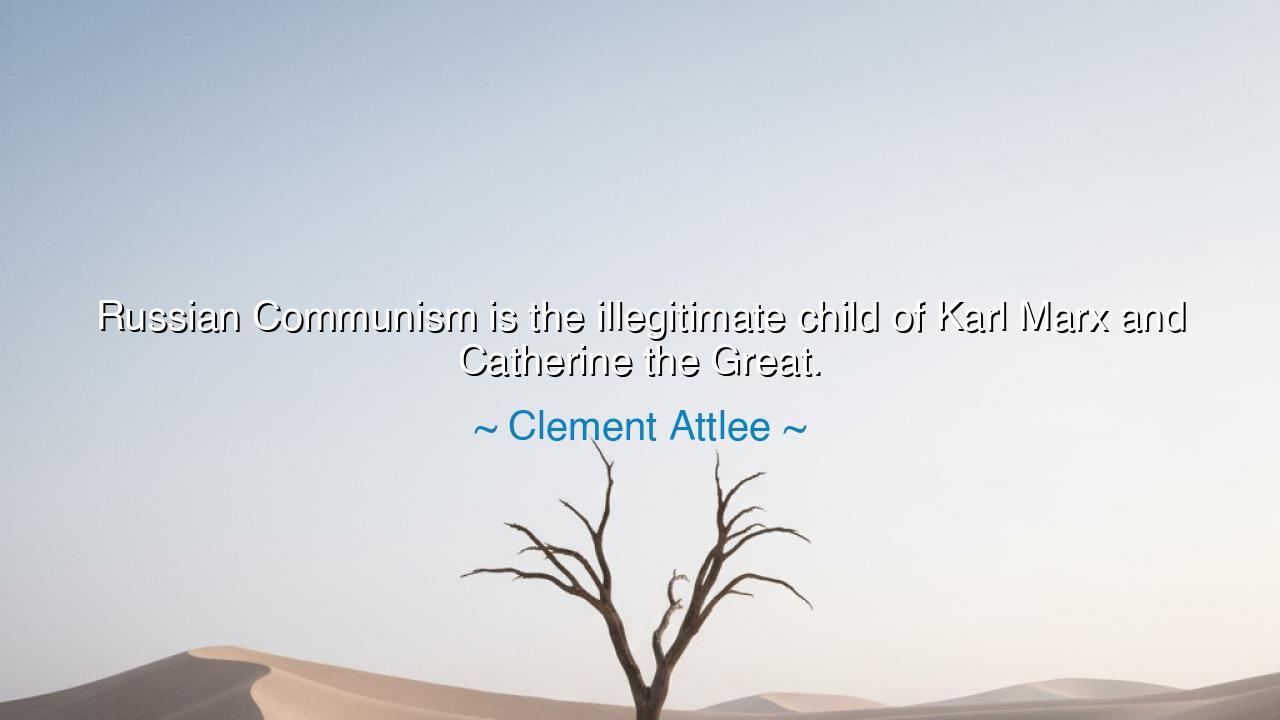
Russian Communism is the illegitimate child of Karl Marx and






When Clement Attlee declared, “Russian Communism is the illegitimate child of Karl Marx and Catherine the Great,” he spoke with both wit and wisdom — compressing centuries of political and moral reflection into a single, piercing sentence. Beneath the humor lies a profound truth: that ideals, when born into the wrong hands or conditions, can become distorted offspring of their original intent. Attlee, a man of balance and moderation, saw in Soviet Communism a perversion of Marx’s dream — a union not of equality and fraternity, but of philosophy and despotism, reason and tyranny. His words, then, are not merely political commentary, but a warning from history itself: that the marriage of noble thought with oppressive power gives birth not to progress, but to monstrosity.
To understand the origin of this thought, one must first see the two figures Attlee invoked. Karl Marx, the father of modern socialism, envisioned a world freed from exploitation, where the workers of all nations would rise together to create a society without masters or slaves. His was a dream of liberation, of humanity restored to dignity. Catherine the Great, by contrast, was the empress of imperial Russia — brilliant, ruthless, and commanding. She modernized her empire through Enlightenment ideas, but she ruled with the iron hand of an autocrat. In Attlee’s metaphor, Marx and Catherine symbolize two forces — the idealist and the ruler, the visionary and the conqueror — whose union could never be legitimate, for it fused freedom with tyranny, and produced a system that bore the name of revolution while wearing the crown of despotism.
When Lenin and later Stalin took up Marx’s banner in Russia, they did so not as philosophers of compassion, but as heirs to a long tradition of absolute power. The Bolshevik Revolution, though born in the fire of justice, quickly hardened into empire. The Russian state, shaped for centuries by autocracy, absorbed Marx’s doctrines but stripped them of their soul. The result, as Attlee observed, was Communism with an imperial heart — a child of revolution raised in the cradle of empire. It preached equality but practiced submission, spoke of liberty while building prisons, promised paradise yet sowed fear. What Marx had meant for mankind, Russia molded for the state.
History has seen this pattern before. When noble ideals descend into politics, they often lose their purity. Consider the French Revolution, which began with the cry of liberté, égalité, fraternité but descended into terror and tyranny. The ideals of the Enlightenment — reason, progress, and justice — were soon wielded by the guillotine. So it was with Communism in Russia: the dream of equality became a doctrine of control. Attlee’s insight was not mockery, but lamentation. He saw how the lofty dreams of thinkers can be twisted by the old human hunger for power.
Yet in his irony, there is also admiration — for Attlee was no enemy of social justice. As Britain’s postwar prime minister, he built the welfare state, bringing healthcare and education to millions. He, too, believed in fairness and community, but he sought them through democracy, not dictatorship. His words, then, remind us that the pursuit of justice must always be tempered by humility and guarded by freedom. To impose equality by force is to destroy the very spirit of it. As Attlee implies, ideas must be born in legitimacy — through consent, compassion, and respect for human dignity. Without these, even the noblest visions become illegitimate children of their own ideals.
The lesson, my listener, is timeless: beware when power claims to act in the name of virtue. The tyrant often cloaks himself in the language of justice; the despot calls himself a reformer. When revolution forgets compassion, it becomes another form of domination. True change must come not from the sword, but from the heart — from the steady labor of free people building together, not from the decrees of the mighty. Remember that no idea, however brilliant, can flourish without the soil of freedom to sustain it.
So, take heed of Attlee’s wisdom: marry ideals with integrity, not with ambition. In your own life, when you dream of better worlds — whether in your work, your family, or your nation — let your vision be noble, but your methods humane. The purity of an idea is preserved only by the purity of its means. As Marx’s theory was corrupted by Catherine’s power, so too can our best intentions be twisted if we forget compassion in pursuit of control.
For the truest revolutions — those that endure — are not forged in palaces or battlefields, but in the quiet courage of people who refuse both injustice and tyranny. Let every generation remember: the future is not born from the marriage of power and idealism, but from the union of truth and humanity. And in that sacred union, the children of progress are always legitimate — for they carry the blood of freedom itself.






AAdministratorAdministrator
Welcome, honored guests. Please leave a comment, we will respond soon